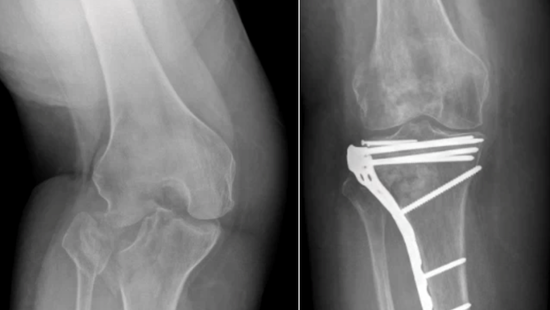Fractures

At University of Maryland Medical Center, we use the most up-to-date technology and techniques during diagnosis, treatment and rehabilitation of bone fractures in our patients. Our orthopedic services make patient-centered care easy.
No matter where you initially received treatment or diagnosis of your fracture, our orthopedic trauma specialists can evaluate and treat your injury.
When you call, one of our team members will ask you some questions to determine which of our specialists would be best for you. We schedule patients with broken bones within one business day.
To make an appointment, call 410-448-6400.
Treatment for a Bone Fracture
Our orthopedic trauma specialists are trained to deal with all types of fractures. During the initial visit, they will discuss your injury and your medical history, review your x-rays and make recommendations for treatment. This may or may not include surgery to realign the bones.
Surgery for Broken Bones
Surgery is not always necessary, but for serious fractures, it may be required. Surgery often involves installing metal parts to maintain correct positioning during the healing process.
Braces and Casts
Sometimes, only a brace is necessary to keep a break in place as it heals, while still allowing some movement. Other times a cast may be used to keep the bone in the proper alignment during healing.
Physical Therapy for a Fracture
During recovery, weakened muscles and joint stiffness are common. Prescribed exercises will help you to regain motion in your joints, strength in your muscles, and flexibility. However, these exercises are typically implemented after the broken bone has begun healing.
Fracture Recovery Time
Bone fractures can take months to heal properly, depending on the severity of the injury.
During this time, the fractured bone regenerates bone tissue, to repair itself. The timeline for this process depends on a variety of factors, including your age, diet, medical history, and location of the fracture.
Every fracture is treated differently, even after a brace or cast is removed. This is why it is important to follow your Orthopedic Surgeon's instructions for recovery.
When Your Fracture Doesn’t Heal Properly
There are many ways that a broken bone may not heal correctly:
- Nonunion
- Infection and osteomyelitis
- Limb deformity or leg length discrepancy
- Joint stiffness or arthritis after fracture
If you are experiencing issues with previous fracture, UMMC Shock Trauma Problem Fracture Program can provide you with the orthopedic care you need for a successful recovery.
